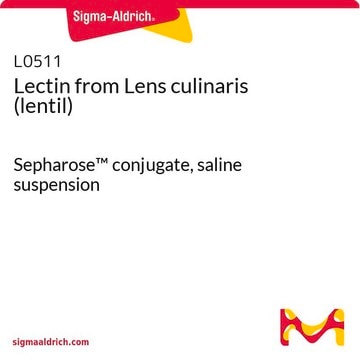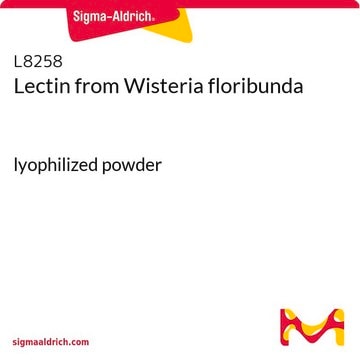L0401
Lectin from Lycopersicon esculentum (tomato)
FITC conjugate, buffered aqueous solution
Synonym(s):
Lycopersicon esculentum agglutinin, LEA
About This Item
Recommended Products
conjugate
FITC conjugate
Quality Level
form
buffered aqueous solution
extent of labeling
2.0-6.0 mol FITC per mol lectin
storage temp.
2-8°C
Looking for similar products? Visit Product Comparison Guide
Related Categories
General description
Application
- for immunofluorescence staining
- for the quantification of vascular perfusion
- for the evaluation of gel perfusion efficiency
Biochem/physiol Actions
Packaging
Physical form
Analysis Note
Storage Class Code
12 - Non Combustible Liquids
WGK
WGK 2
Flash Point(F)
Not applicable
Flash Point(C)
Not applicable
Certificates of Analysis (COA)
Search for Certificates of Analysis (COA) by entering the products Lot/Batch Number. Lot and Batch Numbers can be found on a product’s label following the words ‘Lot’ or ‘Batch’.
Already Own This Product?
Find documentation for the products that you have recently purchased in the Document Library.
Customers Also Viewed
Articles
Find the right lectin for your research with our lectin selection guide, organized by lectin source/species, carbohydrate specificity, blood group specificity, and more.
Find the right lectin for your research with our lectin selection guide, organized by lectin source/species, carbohydrate specificity, blood group specificity, and more.
Find the right lectin for your research with our lectin selection guide, organized by lectin source/species, carbohydrate specificity, blood group specificity, and more.
Find the right lectin for your research with our lectin selection guide, organized by lectin source/species, carbohydrate specificity, blood group specificity, and more.
Our team of scientists has experience in all areas of research including Life Science, Material Science, Chemical Synthesis, Chromatography, Analytical and many others.
Contact Technical Service









